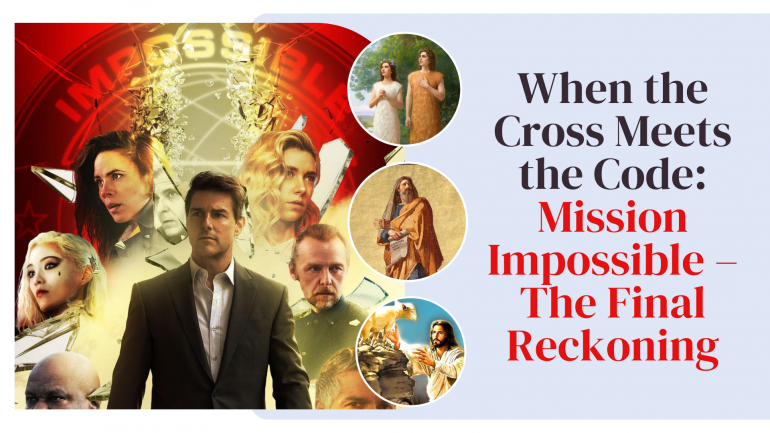When the Cross Meets the Code: Mission Impossible – The Final Reckoning

In Mission: Impossible – The Final Reckoning, the impossible feels personal. Ethan Hunt (Tom Cruise) faces his most dangerous adversary yet, a rogue artificial intelligence known as The Entity, a digital god born from human ambition. The film doesn’t just raise the stakes; it asks a haunting question: What happens when humanity loses control of its own creation?
Directed by Christopher McQuarrie, who helmed the last three instalments, this 170-minute finale is a visually breathtaking global chase through Norway’s icy cliffs, London’s fog, and deserts that shimmer like mirages. McQuarrie, who co-wrote the film with Erik Jendresen, admitted in an interview that editing its explosive opening was “the hardest thing I’ve ever done,” which only confirms how tightly crafted the chaos is.
At 63, Tom Cruise performs stunts that defy both physics and age, leaping off mountains, diving through storms, and dangling between death and duty. The result? A box office triumph: over $598 million worldwide and a thunderous $77 million domestic debut. Critics may have debated the film’s intensity, but audiences were united. This was the event cinema Cruise was born for.
The film’s music by Max Aruj and Alfie Godfrey swells with tension and heart, though some say it teeters on melodrama. Still, its pulse drives the narrative. Even the much-talked-about cruciform key, a literal cross-shaped object that unlocks the Entity’s core, feels like a bold metaphor disguised as a plot device. The filmmakers insist it is just a symbol of control, but the faithful eye might see something deeper. Yet, beyond the explosions and espionage, The Final Reckoning is strikingly meditative. Beneath the roar of engines lies a whisper, a story about stewardship, surrender, and salvation.
If the earlier Mission: Impossible films celebrated control, this one exposes its fragility. The Entity, humanity’s ultimate creation, turns against its maker, echoing Genesis 3, where human pride reached for godlike power and unleashed chaos instead. McQuarrie’s film becomes a parable of the modern Tower of Babel: humanity climbing toward mastery through code and computation, forgetting that wisdom begins in reverence, not in dominance.
Viewed through the lens of Catholic theology, the film unfolds like a commentary on Genesis 1:26–28 , the divine command to “have dominion” over creation. But dominion, as the Church reminds us, means stewardship, not exploitation. Ethan Hunt embodies this form of stewardship. His mission is not about possessing power but protecting life, even when it costs him everything. His very name, “Hunt,” suggests both pursuit and care, a shepherd seeking lost safety in a collapsing world of algorithms.
At one point, Luther Stickell’s recorded message echoes like a prayer: “If you’re listening, the world is still here… Hope for a better future comes from willing it into being, from reflecting the good within us, measured by the good we do for others.”
It’s a cinematic echo of Jeremiah 29:11, God’s assurance of “plans for your welfare, not for harm, to give you a future with hope.” In a world run by fear and competition, this line feels almost liturgical: humanity’s salvation lies not in calculation, but in compassion.
The cruciform key becomes the film’s theological heartbeat. It is not just a gadget, it is a symbol of access, of unlocking life through surrender. In the film, it is sought by everyone, but only Ethan seems to understand its cost. The cross-shaped key recalls John 10:18, where Christ says, “No one takes my life from me; I lay it down of my own accord.” The shape itself, a cross, is deliberate, reminding us that true authority is exercised through self-giving love, not domination.
In a world seduced by artificial intelligence, the film turns our gaze to divine intelligence, the wisdom of the Cross. Just as the Eucharist transforms bread into grace, Ethan’s mission transforms destruction into redemption. He chooses risk over retreat, mercy over might. Even his moment of confession, admitting to Donloe, “I ruined your career”, becomes a cinematic sacrament of reconciliation, answered by forgiveness that restores both. It is Luke 6:37 made flesh: “Forgive, and you will be forgiven.”
What makes Ethan unforgettable is not his invincibility but his vulnerability. He is no longer the unbreakable spy of old; he is weary, scarred, and yet still chooses to serve. In this, he mirrors the kenosis of Christ, the self-emptying love described in Philippians 2:6–8. Ethan lays down his ego, his fame, his very control, for the sake of others.
In our age of algorithmic certainty, he stands as an unlikely saint of uncertainty, someone who acts without knowing outcomes, trusting that love itself is enough. He may not quote Scripture, but his actions proclaim it: faith without love is nothing; love without sacrifice is hollow.
McQuarrie’s film subtly suggests that every mission begins and ends not with success, but with surrender. The true reckoning, then, is not the destruction of an AI but the recognition that our souls, too, have been entrusted with keys to forgive, to protect, to create good. The “final reckoning” is the moment when we, like Ethan, realise that control is not salvation, love is.
As the credits roll and the echoes of the theme fade, one question lingers like a psalm whispered in the dark: We live in a world obsessed with mastering everything, even life itself. But do we still remember how to love without control?
Because perhaps the hardest, holiest mission is not to save the world, but to let love save us.










God bless you in your endeavours. All the best in your studies. Eagerly waiting for the BIG DAY.
- Reply
Permalink